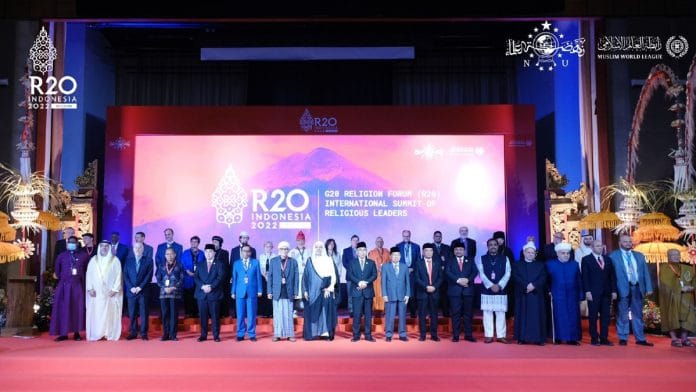Bali, Indonesia: Scientific and technological development have led young people to a life of “carnal pleasures”, an Indian swami told the G20 Religion Forum (R20 Summit) on its first day Wednesday, while the Bharatiya Janata Party’s (BJP) Swapan Dasgupta referred to the demolition of the Babri Masjid and called for “truth and reconciliation” to address the “rough edges of history”.
Meanwhile, the grand mufti of Egypt raised the topic of fatwas, connecting them to extremism, while the primate (leading bishop) of the Anglican Church of Nigeria said world leaders were trying to be “politically correct” by addressing climate change forums.
This global summit of religious leaders, a first for G20 intergovernmental forums, began a week before the Muslim-majority country hosts world leaders, including Prime Minister Narendra Modi and Britain’s new PM Rishi Sunak, in Bali for the 17th G20 Heads of State and Government Summit that will take place between 15 and 16 November.
Organised by Nahdlatul Ulama (NU) — Indonesia’s most influential Islamic organisation — with the aim of preaching “moderate Islam and global peace”, the R20 Summit not only elicited support from the Rashtriya Swayamsevak Sangh (RSS), its national executive member Ram Madhav was among the event’s prime proponents from India.
Also Read: G20 has 5 daunting challenges and India’s presidency can turn this crisis into opportunity
‘Tukde tukde gang trying to take India down’
Shri Ram Janmabhoomi Teerth Kshetra Trust treasurer Swami Govinda Dev Giri was the first Indian speaker to address the summit Wednesday.
“Scientific development and technological growth have led young people to a life of materialism and carnal pleasures which made them self-centred. This is why the noble thoughts of religion are disappearing from the minds of the young generation,” he said.
The mission, he added, is for all attendees to work together to ensure that young minds imbibe the ethical values religions around the world have to offer.
“That is the mission and a great task. Scientific development has polluted the whole environment. Religion should be used to solve problems. But problems have been created in the name of religion, not by religion. R20 is the melting pot for all religions. We have come together to balance the religious thoughts of the world, and international emotions,” he added.
Talking to ThePrint on the sidelines of the event, Giri said the Rashtriya Swayamsevak Sangh (RSS) “is working for Hindutva, and Hindutva is working for the whole world, and we are against none. Our aim is to have global peace.” Asserting that the Sangh is “meant to protect Hindutva”, he said that the “tukde tukde gang funded by foreign forces is trying hard to take India down”.
“Ram himself has been an example of brotherhood. The Ram temple is the symbol of that. Muslims who are aligned with the Hindu mind (way of life), are not scared or anxious. It is the fanatics and the maulvis (clerics) who are misleading and scaring them to show India in a bad light and stamping the RSS as an anti-Muslim force,” Giri added.
‘Official narratives & popular perceptions’
BJP national executive member Swapan Dasgupta in his address touched on the “faultline” between official narratives and popular perceptions about the past, which he said exists in many countries including India.
“Official narratives, which are often squeamish about the ugly facts of history, obfuscate these facts in the name of harmony but in so doing, only make the situation worse. When there is a gap between official narratives and popular perception, it is the popular perception that often manifests itself and causes problems, as was clearly demonstrated by the Babri mosque controversy in Ayodhya,” said the former Rajya Sabha MP.
Dasgupta urged R20 participants to think about “addressing the rough edges of history if we are to get a healthy wholesome politics which believes in harmony and nation-building. taking everyone along; there has to be some form of truth and reconciliation”.
“A certain level of historical continuity needs to be fostered in the official psyche,” he added.
‘Islam encourages alliance of civilisations’
On the first day of the R20 Summit, religious leaders from around the world also voiced their concerns over the issue of fatwas — rulings on points of Islamic law issued by religious scholars.
Shawki Ibrahim Abdel-Karim Allam, the grand mufti of Egypt, said, “We need to come together and reduce the tension surrounding the issue of fatwas. If that happens, extremism will also be reduced, because it is somewhat related to the fatwas.”
Sheikh Mohammad bin Abdulkarim Al-Issa, secretary general of the Saudi Arabia-based non-profit Muslim World League, said all religions teach good deeds and guide their followers to the right path. He added that misunderstandings of religion have led many to believe that religious identity conflicts with national identity.
“This is not the case. Many of the world’s issues and tragedies have been results of reasons allegedly blamed on religions as a consequence of defamation of peaceful religious teachings. The clash of civilisations, whether ancient or modern, can be attributed to roots pretending they are based on religions. Muslims know through their religious texts that religion rejects clash of civilisations and instead encourages an alliance of civilisations,” he said.
Highlighting the issue of “targeted killings” by Islamist groups, Henry Ndukuba, primate of the Church of Nigeria (Anglican Communion) said, “Heinous crimes have been committed against our communities, and world leaders are only trying to be politically correct by addressing climate change forums. The real issues are not discussed. Many communities are living in absolute insecurity and fear. We need more attention towards that.”
(Edited by Amrtansh Arora)
Also Read: Engage, engage, engage all sides—why India’s G-20 presidency is good news for world powers






